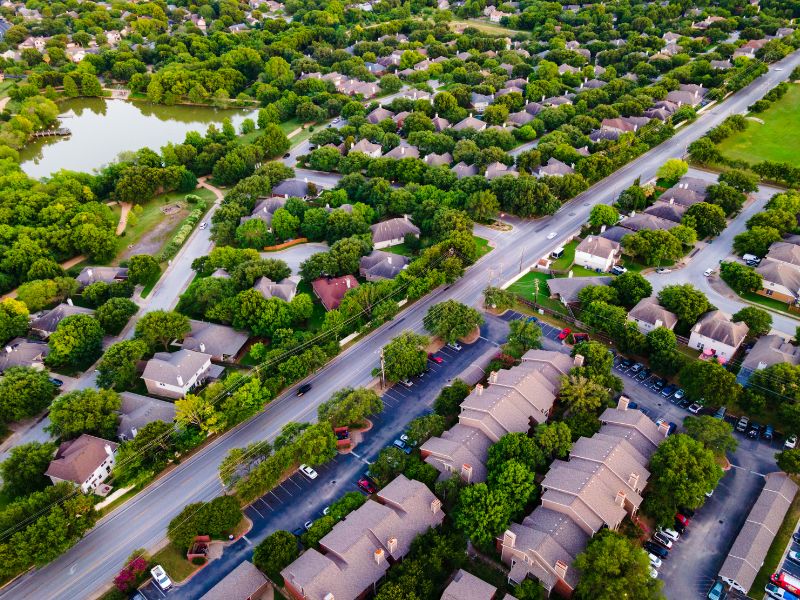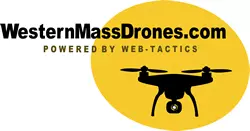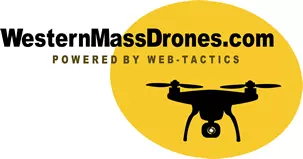
In this article, we'll explore the reasons behind this reluctance and examine why some real estate professionals hesitate to use drone photography. We'll also provide examples of real estate companies that have successfully incorporated drone photography into their marketing strategies and offer solutions for those who want to start using drones but don't know where to begin.
Benefits of Using Drones for Real Estate Photography
Real estate photography has evolved steadily over the years, from high-quality images and videos taken by DSLR cameras to today, where drones have revolutionized how real estate professionals market their properties, providing a unique perspective that was once impossible to achieve.
Here are some of the benefits of using drones for real estate photography:
- Aerial views: Drones offer a unique perspective that was once impossible with traditional photography equipment. With a drone, real estate agents can capture stunning aerial views of properties, showcasing the surrounding areas and providing a bird's eye view of the property, particularly for large properties or those in scenic locations.
- Increased accuracy: Drones have no equal when it comes to capturing the layout of the property and the surrounding landscape from various angles, heights, and perspectives. This flexibility allows realtors to provide a more realistic view of the property.
- Cost-effective: Rather than hiring a helicopter or plane to capture aerial views, real estate agents can use drones to achieve similar results at a fraction of the cost.
- Competitive advantage: Homebuyers have come to expect top-quality photography, videos, virtual walk-throughs, and more from realtors. Realtors who focus on maximizing the visual optimization of their listings will be the ones who attract the most leads, giving them a significant competitive advantage in the market.
Why Some Realtors & Companies Still Don't Use Drone Photography
Despite being tried and tested, many in the real estate industry are yet to adopt drone photography as part of their regular marketing and listing efforts. Based on our experience, here are some reasons why:
Cost and Equipment Requirements:
One of the main reasons some real estate agents and companies hesitate to use drones for real estate photography is the cost and equipment requirements. High-quality drones with good cameras and features can be expensive, and the initial investment may not be feasible for everyone. In addition, drones require regular maintenance and repairs, which can add to the overall cost. Moreover, some real estate agents and companies may not have the expertise to operate and maintain drones, which may require hiring additional personnel or outsourcing the work to a professional drone company.
Legal and Safety Concerns:
Another reason why some real estate agents and companies are not using drones is legal and safety concerns. The Federal Aviation Administration (FAA) regulates the use of drones for commercial purposes, including real estate photography. FAA regulations require drone pilots to obtain a Remote Pilot Certificate and comply with various safety guidelines. Failure to follow these guidelines could result in legal penalties or safety hazards. Some real estate agents and companies may not want to take on the liability associated with drone use or may not want to invest the time and effort required to obtain the necessary licenses and certifications.
Lack of Knowledge and Training:
Lack of knowledge and training is another reason some real estate agents and companies hesitate to use drones. Operating a drone for real estate photography requires specialized skills and expertise, including understanding how to fly the drone safely, taking good aerial shots, and editing the photos afterward. Some real estate agents and companies may not have the time or resources to invest in the necessary training and education to become proficient with drones. In addition, drones may be perceived as challenging to use and require significant expertise or technical know-how to operate effectively.
Less Than Capable Drone Contractors:
Another concern for real estate agents and companies looking to use drones is the quality of drone operators they may hire. Not all drone operators have the same skill and experience, and some may not be capable of capturing high-quality photos or videos. In some cases, real estate professionals may have had a bad experience with a drone contractor, which can discourage them from using drones again.
Real-World Examples of Real Estate Companies Employing Drone Photography
Here are a few examples of real estate companies that have effectively used drone photography to enhance their property listings:
- Redfin: This real estate brokerage firm started using drones to capture aerial footage of properties in 2014. By incorporating drone footage into their property listings, Redfin was able to showcase homes from a unique perspective and provide buyers with a more comprehensive view of the property's layout and surroundings.
- Zillow: In 2017, Zillow launched a program called "Zillow 3D Home" that allows real estate agents and homeowners to create 3D virtual tours of their properties using drones. The program has been an enormous success, with many agents reporting that 3D virtual tours have helped them sell properties faster and at a higher price point.
- Sotheby's International Realty: Sotheby's has used drone photography for luxury property listings since 2014. Sotheby's can highlight unique property features by using drones to capture high-quality aerial footage of properties.
- Houlihan Lawrence: This real estate company based in New York started using drones for property listings in 2016. Since then, they have created a dedicated drone photography team and have incorporated aerial footage into many of their listings. According to the company, properties with drone footage receive more views and sell faster than those without.
These are a few examples of real estate companies successfully incorporating drone photography into their marketing strategies. By using drones to capture aerial footage of properties, these companies have provided buyers with a unique perspective and stand out in a competitive market.
Overcoming the obstacles: Solutions for real estate professionals who want to start using drone photography
While there are some barriers to using drone photography in real estate, they can be overcome with the right approach. Here are some solutions for real estate professionals who want to start using drones:
Cost and equipment requirements
One of the biggest obstacles to using drones for real estate photography is the cost of the equipment. Drones can range from a few hundred to several thousand dollars, depending on their features and capabilities. However, there are several ways to reduce the cost:
- Renting a drone: Some companies offer rental services for drones, which can be a cost-effective way to try out the technology before making a purchase.
- Buying a cheaper drone: While high-end drones are impressive, they may not be necessary for all real estate photography needs. There are many affordable drones available that can still capture great footage.
- Sharing the cost: Real estate agents and companies can team up with other professionals in their area to share the price of a drone.
- Working with a well-respected drone company: In Western Mass, many realtors in the area choose to work with Western Mass Drones as they recognize the value we bring to the table and the benefit of our affordable, high-quality drone services.
Legal and safety concerns
Using drones for real estate photography requires compliance with federal and state regulations and safety guidelines. Real estate professionals can overcome this obstacle by:
- Educating themselves: Real estate agents and companies should take the time to learn about the regulations and guidelines for drone use in their area. They can consult with a drone expert or attend training sessions to ensure they comply with the law.
- Hiring a licensed drone pilot: If a real estate agent or company does not have the necessary certifications to operate a drone, they can hire a licensed drone pilot to handle the photography.
- Obtaining the necessary permits: Some areas require permits for drone use, so real estate professionals should check with their local authorities to ensure that they comply.
Lack of knowledge and training
Finally, some real estate professionals may hesitate to use drone photography because they lack knowledge and training in the technology. To overcome this obstacle, they can:
- Attend training sessions: Many companies offer training sessions for drone use, which can help real estate professionals learn how to operate the technology safely and effectively.
- Hire a drone expert: Real estate agents and companies can hire a drone expert to handle the photography for them. This approach can be a good option for those not interested in learning how to use drones themselves.
- Practice: Like any new technology, drone photography requires training. Real estate professionals can start practicing in open spaces to get used to the controls and camera settings.
Conclusion
Despite the obstacles, drone photography has become an increasingly important tool for real estate professionals looking to capture stunning aerial images of their properties. As technology advances, drones are becoming more affordable, user-friendly, and accessible to real estate agents and companies of all sizes. While some real estate professionals are still hesitant to adopt drone technology, it's clear that those who do are gaining a competitive edge in the market. Agents and companies can attract more buyers and close deals faster by providing unique, high-quality images and videos of properties.
Drones will become even more ubiquitous in the real estate industry. As regulations evolve and become more streamlined, it will become easier for real estate professionals to navigate the legal and safety concerns associated with drone photography. Moreover, drones can capture even more detailed images and videos as technology improves, allowing for new and innovative uses in real estate marketing and analysis. From 3D mapping to virtual reality tours, the possibilities are endless.
In short, the future of drone photography in real estate is bright. While there are challenges to overcome, the benefits of using this technology are clear. Real estate professionals who embrace drone photography will be well-positioned to succeed in an increasingly competitive and fast-paced market.

